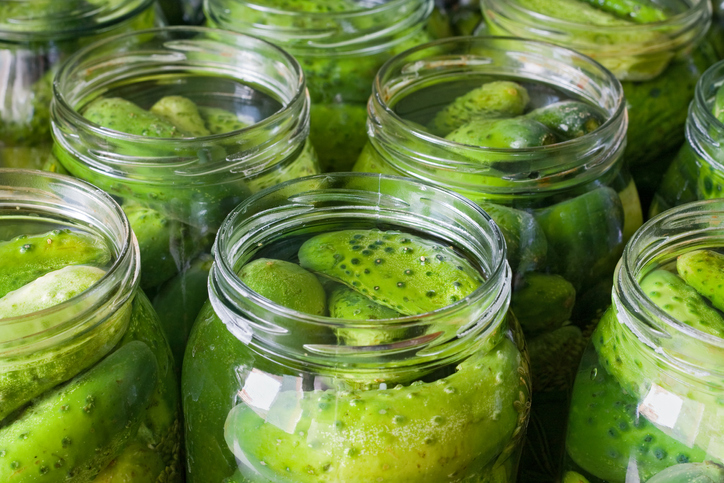“Dill” you like facts about brined cucumbers? Sweet!

HOW OLD IS THAT JAR IN THE FRIDGE?
Pickling is one of the earliest methods of food preservation, and one that hasn’t fundamentally changed all that much in the past few thousand years. Historians have found evidence that cucumbers originated in India, and that they were first pickled in salty brines around 2000 B.C. in the Tigris Valley, located in what is now Syria and Turkey.
THEIR BREAD AND BUTTER
Just what are “bread and butter” pickles, those waffle-cut pickle slices you find on sandwiches and hamburgers? They’re not made with any bread or butter — but that’s what the inventors of bread and butter pickles were after. In 1923, Illinois farmers Omar and Cora Fanning trademarked the phrase “bread and butter pickles” after they’d found success making pickled, sliced, undersized cucumbers, and then bartering them with a grocer in exchange for necessities like…bread and butter. (By the way, those tiny off-white spheres that float in jars of these are a flavoring agent: coriander seeds. Other notable ingredients in this style of pickle are sweet onions and mustard seeds.)
Looking for more trivia? Uncle John's Factual and Actual Bathroom Reader contains 512 pages of all-new articles that will appeal to readers everywhere. Pop culture, history, dumb crooks, and other actual and factual tidbits are packed onto every page of this book.
KOSHER OR NOT KOSHER?
“Kosher” refers to food that has been made and packaged according to the specific, dietary laws of the Jewish faith. But kosher pickles aren’t necessarily pickles. The name refers to a preparation which was developed by European Jewish immigrants in New York City. That means if you buy a jar of kosher pickles, it’s definitely going to pack a wallop of garlic and dill. And if it’s kosher in the traditional sense — as most American-made kosher pickles are — the jar will bear a prominent “K” symbol.
A SMALL FACT
Gherkins are very small pickles, but the name refers not to just any small pickle. The small cucumbers used to make them are native to North America, and are a different species from the larger varieties used to make other, larger pickles.








